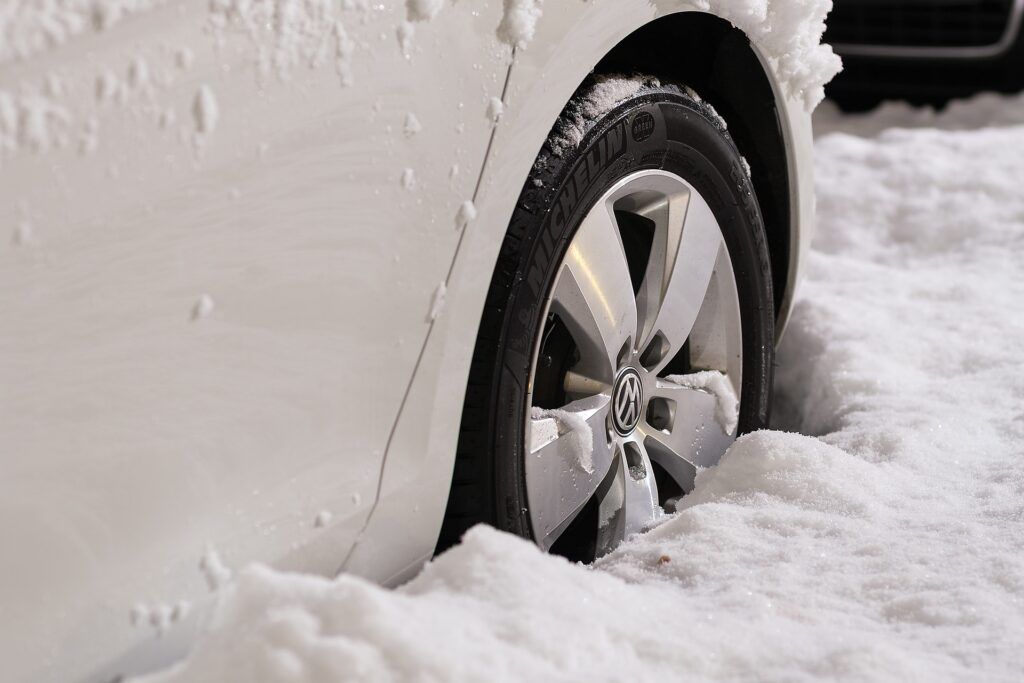
Winter might be a couple of months away yet, but it’s always best to prepare in advance when it comes to getting your car ready to tackle the winter roads.
A common question every winter here in the UK is whether or not it’s worth investing in a set of winter tyres. This month, we’re taking a look at winter tyres and how much use they might be to you once this year’s bout of cold weather strikes.
What are winter tyres?
Winter tyres are a specialist type of tyre made specifically for colder conditions. They are designed to be effective at temperatures below 7°C, offering improved traction and braking in snow and ice, as well as cold and wet conditions.
Generally, most UK drivers will have summer tyres equipped, for improved performance in warm, dry conditions, while a smaller number of drivers will have ‘all season tyres’, designed as a ‘best of both worlds’ tyre, offering decent performance in warm and cold conditions.
Winter tyres will be identified by a snowflake (or snowcapped mountains) symbol on the sidewall, and are made from a softer rubber compound than summer tyres, allowing them to remain soft enough to provide sufficient grip in cold temperatures. Winter tyres have have deeper tread grooves than summer tyres, as well as having finer slits – or ‘sipes’ – cut into the tread block, all in the name of improved grip in the snow.
Reasons to change to winter tyres
Changing to winter tyres is a topic of debate each and every winter here in the UK; while some may be skeptical of the improvement on offer – and hesitant to invest in a whole new set of tyres – there are definitely some good reasons to consider making the switch in the run up to winter.
Because winter tyres are made specifically for colder conditions, they naturally provide improved performance over summer tyres on snowy, icy and cold roads. They have higher silica content so, unlike summer tyres, they won’t harden and lose grip in colder temperatures; instead, they remain soft.
In the snow and ice, braking is vastly improved with winter tyres; stopping distance is dramatically shortened when compared to summer tyres in the same conditions, and skid resistance is also vastly enhanced. This provides a huge boost to general safety when tackling the treacherous winter roads, which should be a major concern for all drivers.
Using summer tyres in temperatures below 7°C will advance tyre wear, which decreases mileage. Switching to winter tyres instead can help improve mileage in the winter, and save the condition of your summer tyres – meaning you won’t have to replace them as frequently.
Reasons not to change to winter tyres
Despite the advantages of winter tyres, both to safety and performance, there are still some reasons some people decide not to make the change. This is largely in part due to the situational benefits. For drivers living in more remote areas, where roads see less winter maintenance and the conditions remain more extreme for longer, installing winter tyres is definitely a wise choice. However, for drivers in cities or more central, built-up locations where roads are consistently gritted and snow and ice only remain for a day or two, winter tyres may not be worth the cost.
It very much depends on how much of the season you are likely to spend on the roads under 7°C – if you’re driving long distances every day during the coldest stretches of winter, winter tyres are a good idea. If you’re only driving semi-regularly and for short distances, you may be tempted to look for alternative measures. Snow socks for your tyres can provide a decent, temporary measure, but are effective only in the snow, and don’t offer the same grip or traction as winter tyres. However, snow socks are quick and easy to fit, perfect for when the snow starts falling just as you’re planning to head out for a drive.
Cost vs benefit of winter tyres
Buying a new set of winter tyres can be expensive, and some may not be able to justify the cost. This also brings up issues with storage: not only will you need the space to store your summer tyres during the winter (and vice versa) but you will want to invest in a spare winter tyre in case something goes awry. Costs can quickly add up – especially if you have to pay to store your other tyres elsewhere because you don’t have the room.
However, they do offer noticeable benefits specifically in these conditions. Even if your local area doesn’t usually suffer greatly from snow or ice, you can’t put a price on safety – especially vehicle safety. Winter tyres will be helpful when it comes to driving safely and steadily in the winter, so it’s definitely worth investing in a set before the winter hits, so you can be confident that you’re prepared for whatever mother nature throws at you.
Oaks Services offer affordable and expert car maintenance, repairs and servicing to all our customers. Our highly skilled team are here for you whatever the weather, providing excellent and comprehensive customer service to help you get up and running as fast and efficiently as possible. For more information, don’t hesitate to get in touch with us today.

